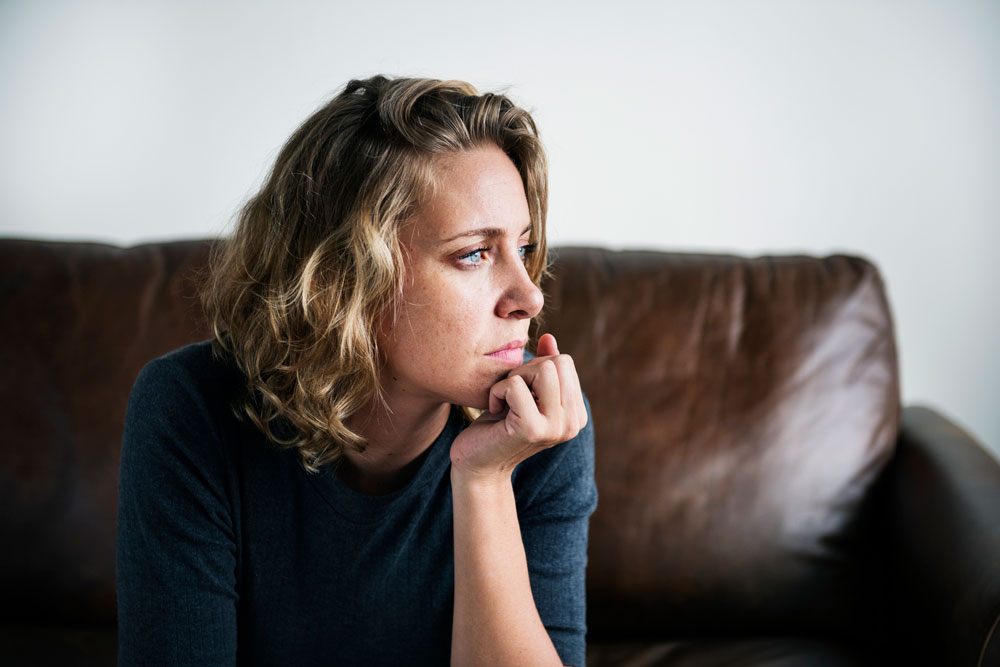Coping With COVID-19 and Seasonal Depression
Dec. 3, 2020
The days are getting shorter and COVID-19 cases are spiking. Increased stress due to the pandemic and its companions — isolation, the challenges of navigating kids’ education schedules, potential economic hardship, a polarized political climate and the fear of, or reality of, losing loved ones — all add to the mental health burden people are feeling right now. Together, all this may make this winter more difficult.
The coronavirus pandemic has caused a surge in mental health issues. Studies from the Centers for Disease Control and Prevention* have shown increases in substance use and suicidal thoughts.
This winter, experts expect to see an increase in the number of people suffering from seasonal affective disorder (SAD). SAD is a form of depression that happens regularly during the year, typically during late fall or winter, and lasts until spring.
This year, the stresses of living through the pandemic will likely magnify the symptoms, says Dr. April Richardson, a psychiatrist and medical director with BlueCross BlueShield of South Carolina.
“The holidays are already a tough time for people with mental health conditions. Sometimes it is because of the loss of a loved one or missing someone who isn’t there,” she says. “Now there is a compounding effect because of the pandemic and how that will affect people’s holiday plans.”
Recognizing the symptoms
Knowing the symptoms of SAD or other mental health conditions is an important first step, Richardson says.
SAD symptoms are typically consistent with those that occur with depression. This can include a depressed mood, loss of energy, increased sleep, anxiety, irritability and desire to avoid social contact.
These symptoms are more common in SAD than in other forms of depression:
- Carbohydrate cravings
- Increased appetite
- Excessive sleepiness
- Weight gain
Finding a solution
Maintaining social connections will be important to help with SAD or any depression because of the pandemic, she says. When you can’t safely be together in person, use technology to connect.
Other non-medical ways to treat SAD or other forms of depression include light therapy, a daily 30-minute exposure to a light box that simulates sunlight. You can purchase “happy” lights to add to your self-care or mindfulness routine.
Light therapy doesn’t have to cost anything, though. You can also try to get outside during the day to get natural sunlight. Richardson says the morning sunlight can mimic light therapy. Start by enjoying your coffee outside or going for a walk when you first wake up.
Make sure you are taking time to treat yourself and care for your own well-being. Even one minute of meditation a day can help with mental health conditions. You can follow our one-minute guided meditation below to get started.
If your symptoms negatively affect your day-to-day functioning, contact your primary care provider or a mental health professional. Treatments for SAD include traditional therapy and antidepressant medications.
It is important to find ways to stay active and social throughout the winter, Richardson says. Push yourself to stay engaged with activities you enjoy.
Other ways you may deal with stresses of the pandemic are to disconnect from the news and limit exposure to harmful activities that bring you down such as “doom scrolling” on social media.
Whatever you do, don’t turn to substances like alcohol for relief. Instead of meeting for drinks, consider going for a walk with friends instead. Physical activity has been shown to ease symptoms of depression.

Coping with grief
More than 3,900 South Carolinians have died because of the coronavirus. That means more people may be coping with grief this winter.
If you are grieving the loss of a loved one, Richardson recommends you look for a support group, call upon your personal faith practices (if you have them) or connect with community organizations for help. Some hospitals may offer resources to help with grief. And talk to your doctor if your grief is affecting your ability to function.
Staying connected with other loved ones can also be helpful in dealing with grief, Richardson says. Hosting virtual memorials or incorporating those you have lost into your holiday celebrations may be helpful.
If you don’t have a close connection with someone who has died this year, you may still be dealing with a form of grief as the pandemic wears on.
“A lot of people are being affected by the loss of their normal life because of the pandemic. There’s an aspect of grief and loss with that,” she says.
Maybe you had a vacation planned or were getting ready to be married. Maybe you had big goals for 2020 that haven’t panned out because of the pandemic. Losing these opportunities for “normal” life may impact your mental health.
It is important to know that it is OK to seek help, from family, friends or professionals.
BlueCross members can call the number on the back of their member ID card for help. The South Carolina Department of Mental Health* also has resources available to help cope with stress.
Other resources:
*The Centers for Disease Control and Prevention and the South Carolina Department of Mental Health are independent organizations that provide health information you may find helpful.
Related Reading:
 Treat Yo Self Every Day
Treat Yo Self Every Day
A television show may have brought the idea of “Treat Yo Self” to the mainstream, but taking care of yourself should be on your to-do list every day. A BlueCross health coach offers some ideas for how to get started taking care of yourself every day.
Read More Drinking, Substance Use, Mental Health Issues Up During The Pandemic
Drinking, Substance Use, Mental Health Issues Up During The Pandemic
A recent study from the Centers for Disease Control and Prevention found increases in the number of Americans struggling with mental health conditions like depression, substance abuse and suicidal thoughts. BlueCross' Dr. April Richardson discusses the findings and ways to cope during the pandemic.
Read More 75 Percent of Americans with Behavioral Health Conditions are Continuing Therapy Services During the Ongoing COVID-19 Pandemic
75 Percent of Americans with Behavioral Health Conditions are Continuing Therapy Services During the Ongoing COVID-19 Pandemic
New survey data from the Blue Cross Blue Shield Association (BCBSA) shows that 75 percent of Americans with behavioral health conditions are continuing therapy services during the COVID-19 pandemic because of the prevalence of telehealth and other digital health services.
Read MoreCOVID Update
The COVID-19 public health emergency (PHE) ended May 11, 2023. The COVID-19 national emergency ended April 10, 2023. The standard terms of your health plan or policy now apply to any COVID-19 related services. Please review your schedule of benefits if you have any questions.




















